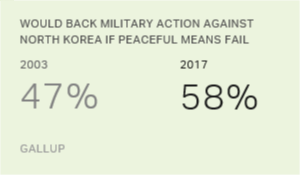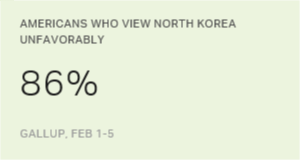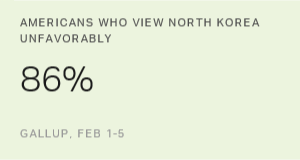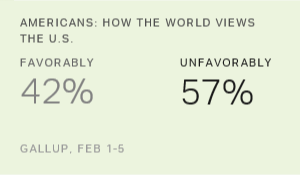Story Highlights
- 58% would back military action against North Korea if peaceful means fail
- Support is significantly higher than in prior measure, from 2003
- Half still think situation can be resolved with sanctions and diplomacy
WASHINGTON, D.C. -- As North Korea continues to launch test missiles and issue provocative threats against the U.S. and its allies in the region, a majority of Americans appear ready to support military action against that country, at least as a last resort. More specifically, 58% say they would favor taking military action against North Korea if economic and diplomatic efforts fail to achieve the United States' goals. This is significantly higher than the 47% in favor the last time Gallup asked this, in 2003.
| Favor | Oppose | No opinion | ||||||||||||||||||||||||||||||||||||||||||||||||||||||||||||||||||||||||||||||||||||||||||||||||||
|---|---|---|---|---|---|---|---|---|---|---|---|---|---|---|---|---|---|---|---|---|---|---|---|---|---|---|---|---|---|---|---|---|---|---|---|---|---|---|---|---|---|---|---|---|---|---|---|---|---|---|---|---|---|---|---|---|---|---|---|---|---|---|---|---|---|---|---|---|---|---|---|---|---|---|---|---|---|---|---|---|---|---|---|---|---|---|---|---|---|---|---|---|---|---|---|---|---|---|---|---|
| % | % | % | ||||||||||||||||||||||||||||||||||||||||||||||||||||||||||||||||||||||||||||||||||||||||||||||||||
| Sep 6-10, 2017 | ||||||||||||||||||||||||||||||||||||||||||||||||||||||||||||||||||||||||||||||||||||||||||||||||||||
| U.S. adults | 58 | 39 | 4 | |||||||||||||||||||||||||||||||||||||||||||||||||||||||||||||||||||||||||||||||||||||||||||||||||
| Republicans | 82 | 16 | 3 | |||||||||||||||||||||||||||||||||||||||||||||||||||||||||||||||||||||||||||||||||||||||||||||||||
| Independents | 56 | 40 | 4 | |||||||||||||||||||||||||||||||||||||||||||||||||||||||||||||||||||||||||||||||||||||||||||||||||
| Democrats | 37 | 61 | 3 | |||||||||||||||||||||||||||||||||||||||||||||||||||||||||||||||||||||||||||||||||||||||||||||||||
| Jan 3-5, 2003 | ||||||||||||||||||||||||||||||||||||||||||||||||||||||||||||||||||||||||||||||||||||||||||||||||||||
| U.S. adults | 47 | 48 | 5 | |||||||||||||||||||||||||||||||||||||||||||||||||||||||||||||||||||||||||||||||||||||||||||||||||
| Republicans | 59 | 35 | 6 | |||||||||||||||||||||||||||||||||||||||||||||||||||||||||||||||||||||||||||||||||||||||||||||||||
| Independents | 41 | 54 | 5 | |||||||||||||||||||||||||||||||||||||||||||||||||||||||||||||||||||||||||||||||||||||||||||||||||
| Democrats | 41 | 54 | 5 | |||||||||||||||||||||||||||||||||||||||||||||||||||||||||||||||||||||||||||||||||||||||||||||||||
| Gallup | ||||||||||||||||||||||||||||||||||||||||||||||||||||||||||||||||||||||||||||||||||||||||||||||||||||
U.S. attitudes about striking North Korea are partisan, as they were in 2003. Eighty-two percent of Republicans in the Sept. 6-10 Gallup poll say they would favor military action if peaceful means fail, compared with 37% of Democrats.
The percentage of Democrats who favor military action has hardly changed since 2003: 37% now vs. 41% then. The major shift has been among Republicans, whose support for military action is up 23 percentage points, while independents' support is up 15 points.

Gallup Analytics
Subscribe to our online platform and access nearly a century of primary data.
Longstanding tensions over North Korea's nuclear program came to the surface in 2002, when George W. Bush described North Korea as "a regime arming with missiles and weapons of mass destruction, while starving its citizens." He also grouped it with Iran and Iraq as part of an "axis of evil" that was "arming to threaten the peace of the world."
Later that year, North Korea revealed it had been maintaining a nuclear program in violation of the Nuclear Nonproliferation Treaty, and soon afterward, in January 2003, Gallup first measured Americans' views about how to handle the regime.
At that time, 72% of Americans were optimistic that the situation involving North Korea could be resolved using only economic and diplomatic efforts. Far fewer today, 50%, believe nonmilitary pressure can work, while nearly as many, 45%, are skeptical.
| Yes, can be | No, cannot | No opinion | |||||||||||||||||||||||||||||||||||||||||||||||||||||||||||||||||||||||||||||||||||||||||||||||||
|---|---|---|---|---|---|---|---|---|---|---|---|---|---|---|---|---|---|---|---|---|---|---|---|---|---|---|---|---|---|---|---|---|---|---|---|---|---|---|---|---|---|---|---|---|---|---|---|---|---|---|---|---|---|---|---|---|---|---|---|---|---|---|---|---|---|---|---|---|---|---|---|---|---|---|---|---|---|---|---|---|---|---|---|---|---|---|---|---|---|---|---|---|---|---|---|---|---|---|---|
| % | % | % | |||||||||||||||||||||||||||||||||||||||||||||||||||||||||||||||||||||||||||||||||||||||||||||||||
| Sep 6-10, 2017 | 50 | 45 | 4 | ||||||||||||||||||||||||||||||||||||||||||||||||||||||||||||||||||||||||||||||||||||||||||||||||
| Jan 3-5, 2003 | 72 | 20 | 8 | ||||||||||||||||||||||||||||||||||||||||||||||||||||||||||||||||||||||||||||||||||||||||||||||||
| Gallup | |||||||||||||||||||||||||||||||||||||||||||||||||||||||||||||||||||||||||||||||||||||||||||||||||||
Notably, there is a strong relationship between Americans' views on the effectiveness of diplomacy and their support for taking military action against North Korea. Those who are skeptical of the value of diplomacy are more likely than those who believe diplomacy can work to say they would favor using military action if peaceful means fail -- 75% vs. 43%, respectively.
Americans Still Think North Korea Is Bluffing
Despite North Korean leader Kim Jong Un's fiery rhetoric in recent months about destroying the U.S. mainland, far less than half of Americans, 38%, consider it likely that North Korea will take military action against the U.S. in the next six months. This is up from 28% in the prior measure from 2013 but is still the distinct minority view.
| Likely | Not likely | No opinion | |||||||||||||||||||||||||||||||||||||||||||||||||||||||||||||||||||||||||||||||||||||||||||||||||
|---|---|---|---|---|---|---|---|---|---|---|---|---|---|---|---|---|---|---|---|---|---|---|---|---|---|---|---|---|---|---|---|---|---|---|---|---|---|---|---|---|---|---|---|---|---|---|---|---|---|---|---|---|---|---|---|---|---|---|---|---|---|---|---|---|---|---|---|---|---|---|---|---|---|---|---|---|---|---|---|---|---|---|---|---|---|---|---|---|---|---|---|---|---|---|---|---|---|---|---|
| % | % | % | |||||||||||||||||||||||||||||||||||||||||||||||||||||||||||||||||||||||||||||||||||||||||||||||||
| Sep 6-10, 2017 | 38 | 59 | 3 | ||||||||||||||||||||||||||||||||||||||||||||||||||||||||||||||||||||||||||||||||||||||||||||||||
| Apr 2-3, 2013 ^ † | 28 | 58 | 14 | ||||||||||||||||||||||||||||||||||||||||||||||||||||||||||||||||||||||||||||||||||||||||||||||||
| ^ Asked of a half sample; † Asked on Gallup Daily tracking survey | |||||||||||||||||||||||||||||||||||||||||||||||||||||||||||||||||||||||||||||||||||||||||||||||||||
| Gallup | |||||||||||||||||||||||||||||||||||||||||||||||||||||||||||||||||||||||||||||||||||||||||||||||||||
Regardless, news about North Korea's recent testing of missiles and nuclear weapons has certainly caught Americans' attention. The 83% saying they have been following the story very or somewhat closely is among the highest for any major news story Gallup has measured, ranking 15th out of more than 200 stories rated since 1991.
Bottom Line
In a change from 2003, a majority of U.S. adults say they would favor military action against North Korea to achieve the United States' goals if peaceful means fail. A sharp increase in support among Republicans -- possibly mirroring President Donald Trump's promise to respond with "fire and fury" to North Korean leader Kim Jong Un's threats -- explains much of this.
Since 2003, Americans have also become less optimistic that economic and diplomatic pressure can resolve the situation, but half still believe this. Thus, while Americans are willing to support military action as a last resort, they evidently don't believe the situation has reached that point. However, this could be the linchpin in Americans' attitudes about the region. If Americans come to believe that sanctions and diplomacy are futile, support for pre-emptive military action could rise.
Survey Methods
Results for this Gallup poll are based on telephone interviews conducted Sept. 6-10, 2017, with a random sample of 1,022 adults, aged 18 and older, living in all 50 U.S. states and the District of Columbia. For results based on the total sample of national adults, the margin of sampling error is ±4 percentage points at the 95% confidence level. All reported margins of sampling error include computed design effects for weighting.
Each sample of national adults includes a minimum quota of 70% cellphone respondents and 30% landline respondents, with additional minimum quotas by time zone within region. Landline and cellular telephone numbers are selected using random-digit-dial methods.
View survey methodology, complete question responses and trends.
Learn more about how the Gallup Poll Social Series works.




